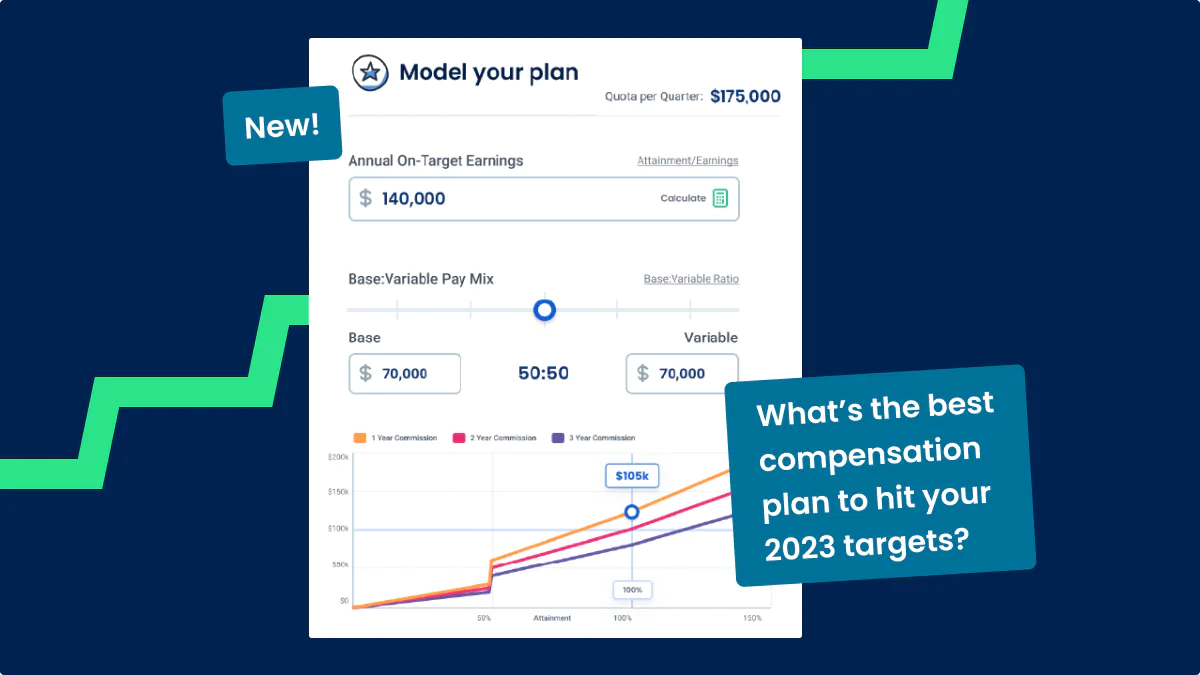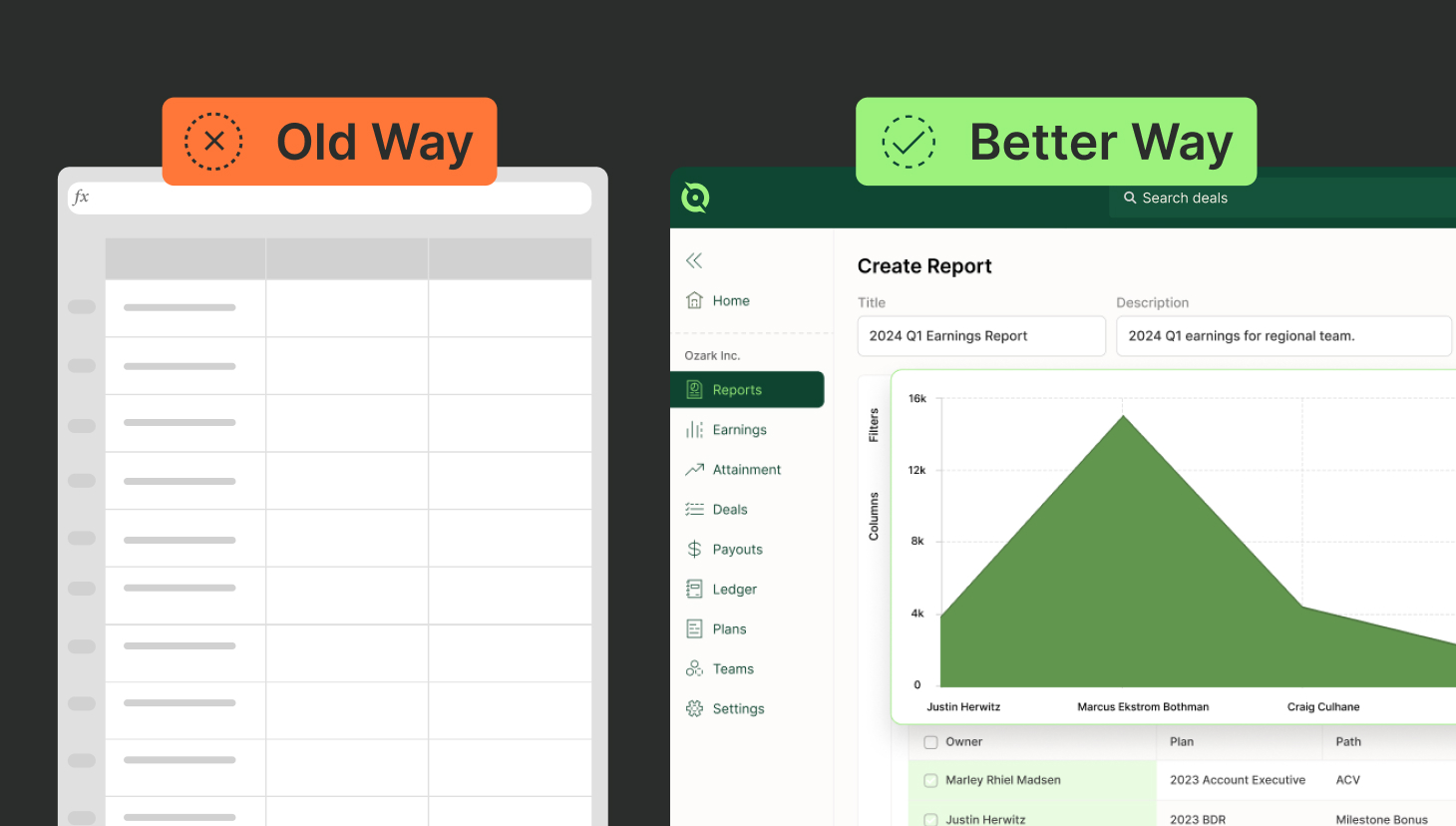In August, we surveyed more than 300 leaders and sales reps to get a pulse on today’s sales compensation trends.
With 38 questions around sales commissions structure, ownership, and rep motivation, we aimed to uncover where organizations struggle the most. What we found was the startling realization that 9 out of 10 leaders don’t trust they have the right compensation strategy in place.
This lack of trust spills into the individual contributor (IC) roles, where 75% of sales reps admitted they don’t trust their companies to pay them fairly.
Below, we reviewed our biggest takeaways with immediate steps your organization can take to right your commission plan.

5. The “most common” tiered commission structure
Based on the data from the survey, we built out the most widely adopted sales commission structure for SaaS sales compensation.
The components of this plan include:
- Base salary: 50% of OTE
- Quota period: Quarterly
- Quota:OTE ratio: 4-7x
- Components: Accelerators and decelerators tied to quota attainment
- Payment schedule: The majority of companies pay commissions upon the deal closing (vs. invoice payment, or usage-based models)
For early-stage companies, sales leadership most frequently led the design of the compensation plan. That responsibility pivoted to RevOps for later-stage companies. And, at both stages, leaders introduced new comp plans most frequently on a yearly basis.
Build and model this plan in Compensation Hub.
Now, if your compensation plans fall outside of these trends, that’s okay.
Your plan should reflect your business, so if your sales cycles, revenue, and maturity curves don’t follow suit with another organization’s, then your comp plan shouldn’t follow either.

Compensation Hub
Discover, compare, and build compensation plans. Customize compensation models using 9 variables.
Find Compensation Plans“If you have inconsistent plans for each person in your organization, you end up underpaying women and people of color,” said Graham Collins, our Chief of Staff.
Our VP of Sales Caroline Tarpey agreed and mentioned how standardizing plans impacts recruiting efforts.
“People crave transparency in our organizations. When we standardize these, we’re giving that equitable opportunity to the team,” said Caroline. “We’ve seen it become a tool in the recruiting process. It’s viewed as very positive across the board.”
Pro tip: Use Compensation Hub to standardize your plans for all ICs who share the same title. You can then use the Growth Curve in the top right corner to show job recruits their earnings potential according to your business metrics.
3. Reps trust comp plans built by Sales Leadership the most
Given that Sales Leaders typically emphasize what’s best for the rep versus Finance, it’s no surprise that reps trust plans designed by their leadership.
What is surprising, however, is the downward trend of reps lacking trust in plans built by RevOps. For instance, in a survey we conducted in 2020, reps had the most confidence in the plans RevOps created.
This shift tells us that RevOps can do a better job collecting feedback from their sales teams.
Our Sr. Director of RevOps, Ryan Milligan, does this by hosting monthly one-on-ones with every member of the sales org.
No matter which department runs compensation planning, remember to keep your reps in the loop on future comp plan changes. Ask for feedback, and explain the math and the reasoning behind the different mechanics of the plan. Most importantly, share how the company will help them reach their targets.
Conversely, ICs who received plans once a year felt most confident that their pay was accurate.
So, what’s the takeaway here?
Fewer changes equal more trust.
In our experience, we see leaders issue more comp plan changes with the presence of a volatile market, uncertainties or changes to sales cycles and pricing, and shifts in strategic business objectives.
One way to get ahead of those changes, and foster trust along the way, is to come up with the business goals first, then leverage the comp plan to drive those. That means if your company introduces a new product while sunsetting another, your comp plan should pay enough on the new product to motivate reps to sell that over the existing one.
Setting expectations from the onset will also establish trust. If you think you’ll have to modify your plans throughout the year, be upfront with your reps to avoid blind sighting them later. For help rolling out changes, check out this example compensation communication plan.
Pro tip: Run different scenarios and experiment with a compensation plan template and modeler in our free, ungated resource, Compensation Hub. As an example, if predictable revenue is a goal, consider the Single Rate Commission with Contract Term Multiplier plan or the Commission with Multi-Year Accelerators plan.
1. 86% of reps rank compensation as their top priority when job hunting
“Having this compensation conversation early on in the interview process is really important,” Graham said.
Your recruits will ask about it, so it’s on you to share transparently. Show them their earnings potential (feel free to use Compensation Hub’s Growth Curve as a visual). A good interviewer will ask how many of your reps actually hit their on-target earnings (OTE), so be prepared to speak to that percentage.
Note: If your attainment is less than 80%, that may signal future changes to your comp plans.
To ensure your base salaries and variable pay packages compete with market standards, invite your People Team to the table. They play a critical role in securing solid sales talent and will bring market data to the conversation.
About Compensation Hub
QuotaPath’s newest (free) resource, Compensation Hub, invites Sales, RevOps, and Finance leaders to discover, compare, customize, and share compensation models. Strike the right balance between pay and performance to successfully align your compensation strategy to your business strategy.
About QuotaPath
QuotaPath provides a sales compensation and commission tracking platform for scaling GTM teams. Pairing an easy-to-use user experience with a highly technical backend, QuotaPath is the only solution fit to get Sales, RevOps, and Finance all on the same page.
To see how we fit into your tech stack, check out our integrations page. To learn more, book a time with a member of our team today.




